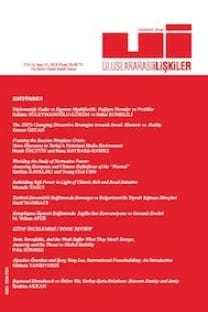Fanar HADDAD, Sectarianism in Iraq - Antagonistic Visions of Unity
Sectarianism, Iraq
Fanar HADDAD, Sectarianism in Iraq - Antagonistic Visions of Unity
Sectarianism, Iraq,
___
- .......
- ISSN: 1304-7310
- Başlangıç: 2004
- Yayıncı: Uluslararası İlişkiler Konseyi Derneği İktisadi İşletmesi
Ekolojik Kriz Karşısında Devletin Rolü Üzerine İdeolojik Bir Tartışma
Uluslararası İlişkilerde Sosyal Ontoloji Kavrayışının Meta-Teorik Eleştirisi
Türk-Yunan Rekabeti Üzerine Vaka Analizi: Büyük Güçler Bağlantısı ve Rekabet Direnci
Deniz Ş. SERT, Konstantinos TRAVLOS
Dış Politika Yapımında Mezhepsel Aktörler: 2006 Lübnan Savaşı’na Yeniden Bakış
Bernhard SCHLINK, Varol(a)mayan İdeal: Yurt
Savaşların Açıklanmasında “Fırsat ve İsteklilik” Ön Kuramsal Çerçevesi ve Kullanım Alanları
Uluslararası Güvenliği Yeniden Düşünmek: Uluslararası İlişkiler Disiplininde Feminist Eleştiriler
Ayşe Ömür ATMACA, Pınar GÖZEN ERCAN
Türk Dış Politikası Krizlerinde Hükümetler, Cumhurbaşkanları ve Başbakanlar
